 WIE Japan
WIE Japan
IEEE Japan Council Women in Engineering Affinity Group
2006 Events
Lecture by Dr. Sandra Zilles
In the evening of 20 Feb. 2006, a lecture by Dr. Sandra Zilles from DFKI
(German Research Center for Artificial Intelligence) was held at the
Collaboration Room, Tokyo Institute of Technology, as the fourth public
lecture of WIE Japan. As a computer scientist, she focused her topic on
women in computer science in Germany. Based on the hard data, she gave
an overview of the situation of woman in computer science in German
firstly, and then discussed on why there is few women in computer
science based on her original analysis and experiences. Even it was a
heavy rainy day, almost packed audience participated the lecture and
questionnaire survey shows many audience were very interested in her
analysis and got a lot of hint from her talk.
The lecture was co-sponsored by the IEICE Committee for Promoting Equal
Participation of Men and Women, and IEEE Student Branch at Tokyo
Institute of Technology.
(Reported by Xiaowei Kan and Akinori Nishihara)
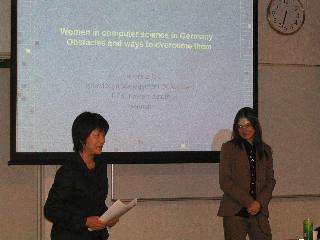
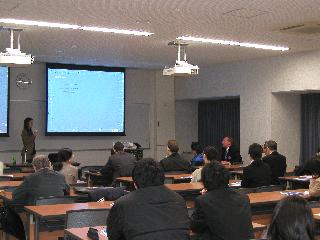
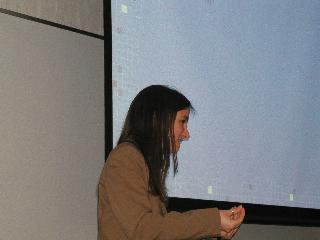
Presentation Material by Dr. Zilles
We can lend a CD-ROM of her presentation video.
Women in Robotics, Human Science and Society
Read a report of Panel
Discussion held on March 8 (in Japanese).
Lecture by Dr. Lemonia Ragia
In the evening of Thursday, March 16, 2006, there was a lecture meeting at
the Center for the Advancement of Working Women in Tokyo. The
speaker was Dr. Lemonia Ragia, Informatik V (Information Systems), RWTH
Aachen, Germany, and the title of her talk was
"Handicaps to success for women engineers".
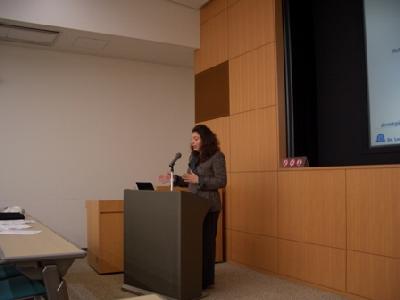
Her presentation material is available here.
Special Lecture and Party to celebrate the First Anniversary of WIE Japan
The lecture meeting was held on 22 July 2006 in the lecture hall of
Ookayama Campus, Tokyo Institute of Technology. Prof. Miki Haseyama and
Prof. Yong-Jin Park gave us their lectures.
Prof. Miki Haseyama (Hokkaido University, IEEE Region 10 WIE Coordinator)
Title: How to enjoy being a woman researcher in Engineering
The first half of the talk was on the current state of gender equality
in the field of science and technology based on the data such as EPMEWSE
- Japan Inter-Society Liaison Association Committee for Promoting Equal
Participation of Men and Women in Science and Engineering. The last half
of the talk was on her carrier development and her research named
"Friendly model". Her talk was full of humor and encouragement.
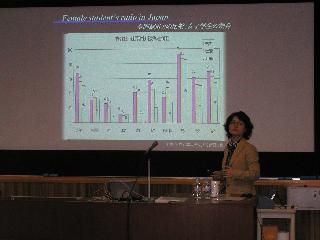
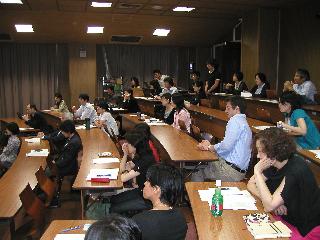
Prof. Yong-Jin Park (Hanyang University, IEEE Region 10 Conference Coordinator)
Title: Recent IT Situation in Korea
This talk covered the recent IT industries and Internet situation in
Korea. Firstly, rapid growth of electric Industry, mobile service
providers, broadband services was shown with statistical data. Then, he
described the secret of Samsung Group realized by achievement-oriented
system and human resource development. He also outlined the dramatic
change of social system caused by ICT, such as e-government, game
industry, e-politics, and e-banking.
The rapid growth of Korea gives us tips for increasing the share of
women in engineering by competitive power.

There were about 30 participants to the party and their background was
diverse including artificial intelligence, software engineering,
electrical engineering, robotics, medical engineering, mechanical
engineering, foreign language and sociology. Prof. Hideki Hashimoto, the
IEEE Japan Council Treasurer congratulated the first anniversary of this
IEEE Japan Council WIE Affinity Group, and all the participants briefly
introduced themselves.
Both the lectures and the party were so successful. We would like to
thank all the speakers and participants. We are looking forward to
meeting you in the future.
(reported by Mihoko Otake)
This report and discussion after the lectures are summerized in Japanese.
WIE Lecture and Networking: Exchange of South Eastern Asia and Japan
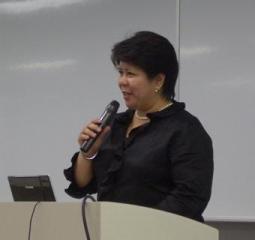
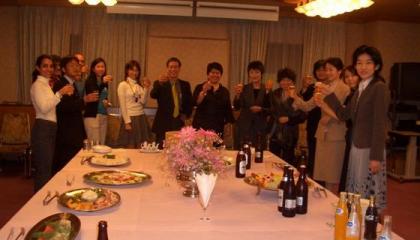
The lecture was held at Tokyo University of Sciences, Kagurazaka Campus
on November 11, 2006. Dr. Rowena Cristina L. Guevara, Dean of
Engineering, University of Philippines lectured her research work and
activities of female researchers in the Philippines.
Title: Women Engineers as Academic Leaders
Read report in Japanese.
Prof. Guevara graduated from the University of the Philippines for her
BS and MS Electrical Engineering degrees in 1985 and 1990 respectively,
and University of Michigan, Ann Arbor in 1997. She did post-doctoral
studies in speech signal processing at the Tokyo Inst. of Technology and
as the first Banatao Fellow at the University of California,
Berkeley.
After graduation in 1985, she joined the faculty of the Dept. of
Electrical Engineering and now holds a Professor position. She was the
Chairman of the EEE Dept. from 1997 - 2003
In July 2004, she became the youngest and first woman Dean of the
College of Engineering, and concurrent Executive Director of the
National Engineering Center.
Her research interests are speech, audio, image and music signal
processing. She is a member of professional societies like the National
Research Council of the Philippines, the Institute of Integrated
Electrical Engineers and IEEE.
In the lecture, first, she mentioned the proportion of female student
and female faculty of universities in the Philippines. By international
standards, the rate of both female students and female faculty are very
high in the Philippines. Especially, in industrial engineering, chemical
engineering, and material engineering, female students outnumber male
students. Even in mechanical engineering, about 20 % of students are
female. When Prof. Guevara was a student, there are only a few female
students per grade. In the past two decades, the rate of female students
increased.
Next, Prof. Guevara's own personal history was shown. From her
childhood, she likes music. Especially, she has great practice in
piano. The talent aids in charity concert to collect donations for
constructing new building in the university.
About research, she told that the selection of research theme is
important. In the beginning, her specialty was electrical power
engineering. Then, she changed her research area to signal processing
in order to respond to the demonds of the modern society. Her research
interests are speech, audio, image and music signal processing.
Lastly, she talked about leadership. After she became the dean, she
modernized university system. For example, she built new university
buildings, introduced remote lecture with concerted efforts of the
University of California at Berkeley. She collected donations for
university from governments and a number of companies and equipped with
new facilities. Students are given practical education that they become
adaptable fighting potential in companies.
Read her presentation material.
Q and A
- : How do you explain significant number of women in both the student
population and in the faculty in the Philippines, as compared to
significantly lower numbers in other countries?
- :
- Don't look at gender during the selection process - but selection
process includes both high school grades and an entrance
exam. Women tend to do worse on the entrance exam, but tend to have
better high school grades, so they still enter university in
significant numbers.
- No special government programs such as affirmative action or
preferential hiring.
- Matriarchal society - women are respected as the head of the family
and the chief manager and decision maker.
- Women don't face the same negative stereotypes - for example, as a
child, she never heard that math is more difficult for girls.
- : How did you invite donations for university?
- : We described industry that if students get good education at
universities, students become adaptable fighting potential for
companies. In negotiations, logical thinking is important.
- : In Japan, women tend to give up her job on marriage or having a
child. How about in the Philippines?
- : Women don't face the same family and childcare responsibilities and
stereotypes - having a nanny (or several) is seen as acceptable and
affordable for a working woman, so that women don't have to choose the
career vs. family.
Reported by Mihoko Otake, Translated by Mariko Aoki








